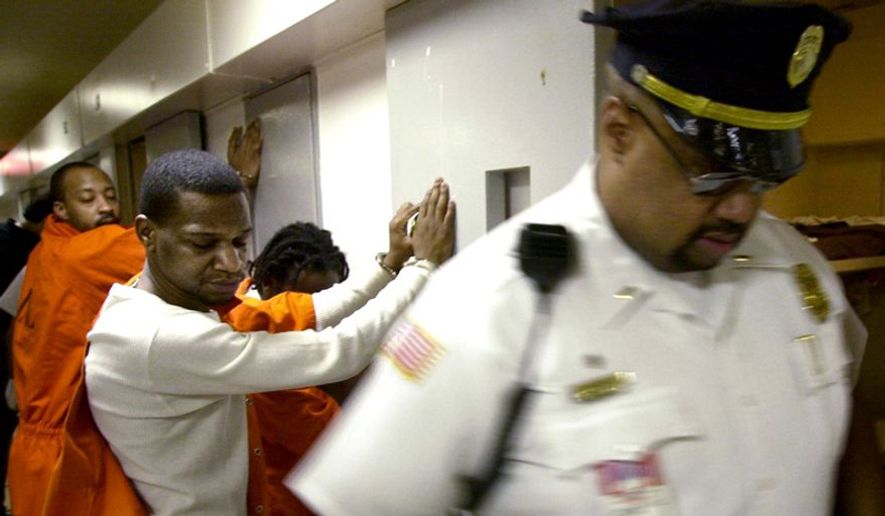A federal judge has dismissed a lawsuit brought by four former D.C. correctional officers who sought permits to carry guns under the same federal law that grants retired and off-duty police the right to carry anywhere in the country without requiring them to obtain state licenses.
The corrections officers had argued that the D.C. Department of Corrections unfairly denied them the documentation they needed to prove to licensing entities in the District and Maryland that they were “qualified retired law enforcement officers” who are allowed to carry under the federal Law Enforcement Officers Safety Act.
Ruling on a technical matter rather than taking up the question of whether correctional officers should be covered under the federal act, U.S. District Judge Rudolph Contreras threw out the lawsuit but encouraged the officers to pursue the matter through administrative means or the D.C. Superior Court. It’s a step the correctional officers say they plan to pursue in addition to an appeal.
“I’m prepared to go as far as I have to go,” said Ronald DuBerry, who retired from the DOC in 2002. “I spent 31 years in law enforcement — give me what I earned.”
Judge Contreras wrote in a 36-page opinion issued late last month that the correctional officers had incorrectly asserted a right to certification as qualified officers who were eligible to carry, rather than a right to carry a firearm under the federal law. He noted that LEOSA, which was signed into law in 2004 by President George W. Bush, “does not create an implicit, stand alone procedural right to be classified correctly.”
The question, he wrote, was not “whether the District has caused some injury to their interests … but whether the right at issue is an individual right unambiguously created by LEOSA.”
SEE ALSO: Retired jail officers sue D.C. for right to carry guns for protection
To attorney Aaron Page, who represents the men, it’s a situation akin to blocking a voter from entering a polling station by declaring that while the right to vote is protected the right to enter a polling station is not.
“If you don’t have these certifications, the right doesn’t apply to you,” he said.
The judge made no determination as to whether DOC officials were correct to reject the correctional officers’ assertions that they were “qualified law enforcement officers.”
With that question still outstanding, Mr. Page said his clients plan to appeal and he also plans to seek other remedies through administrative venues as well as by reaching out to D.C. lawmakers.
Police officers, federal law enforcement officials, sheriff’s deputies and even Amtrak police can qualify under the federal law as long as they meet other criteria, such as retiring in good standing and keeping up firearms qualifications. But across the country, varying interpretations of the law may or may not allow those who staff the country’s jails and prisons to carry guns outside of work.
The federal law stipulates that among the requirements for a government employee to be a qualified law enforcement officer, he or she must be “authorized by law to engage in or supervise the prevention, detection, investigation, or prosecution of, or the incarceration of any person for, any violation of law, and has statutory powers of arrest” and “authorized by the agency to carry a firearm.”
The Department of Corrections has maintained that D.C. law does not give corrections officers law enforcement status and arrest authority.
The first step in getting the federal certification under LEOSA is to have a former employer sign paperwork to certify law enforcement experience. But when human resource officials at the city’s jail received the requests from retired correctional officers, officials checked a box indicating that the corrections officers did not have “statutory powers of arrest,” an automatic disqualifier for those seeking to carry under the federal statute.
“The court’s ruling is in keeping with the Department’s interpretation of the federal Law Enforcement Officers Safety Act’s requirements,” said DOC spokeswoman Sylvia Lane. “It has been Director Tom Faust’s position that Correctional Officers do not meet the requirement as sworn law enforcement with full arrest powers.”
Mr. DuBerry and three other retired officers — Robert L. Smith, Harold Bennette and Maurice Curtis — all say that they have endured threats by former inmates they’ve encountered on the street and that they like other law enforcement officers should be granted the right to carry under the federal law in order to protect themselves. All four retired officers live in either the District or Maryland, where gun owners must demonstrate some level of necessity before they are approved for concealed carry permits.
Mr. Curtis, who lives in Prince George’s County, said he has plenty of need. Describing an incident from two months ago, he recalls taking his wife out to a bar in the District when a man called out his name on the street and then gestured like he had something in his pocket. Mr. Curtis took it to mean the man had a gun and he postured back.
“I didn’t have my weapon on me but I made it look like I had my weapon,” he said. “They recognize us before we recognize them.”
Whether they could qualify under either Maryland or the District’s concealed carry permitting scheme, the correctional officers are unsure. But it’s beside the point to Mr. Curtis.
“We’re trying to get our business taken care of. They are continuing to deny us something that we have earned,” he said.
• Andrea Noble can be reached at anoble@washingtontimes.com.




Please read our comment policy before commenting.